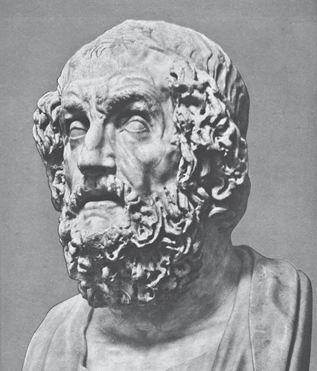According to ancient Greek historians, Homer lived in about 800 BC and composed two of the most influential texts in Western literature, The Iliad and The Odyssey. The two long poems both tell stories related to the victory of Sparta and its allies in the Trojan War, a major turning point in Greek history.

However, many modern scholars doubt that a poet named Homer ever existed. The Iliad and The Odyssey may instead have evolved from centuries of oral tradition; alternatively, Homer may have been a real person who compiled and refined the traditional epics into their present form. In either case, the existence of the blind poet of legend may never be proved or disproved definitively.
The influence of the two poems, however, is indisputable. Considered the first works of Western literature, The Iliad and The Odyssey have inspired writers, poets, and artists for three millennia, from Virgil (70–19 BC) to James Joyce (1882–1941) to Ralph Ellison (1914–1994).
According to Greek mythology, the Trojan War began after Paris, the prince of Troy, kidnapped Helen, the wife of Sparta’s king. The enraged king, Menelaus, assembled a giant force to attack Troy and retrieve his wife. The army included the warrior Achilles and Odysseus, the king of Ithaca. Menelaus besieged Troy for ten years before finally conquering the city.
The Iliad, which scholars believe was written first, tells the story of Achilles and the final year of the siege. The Odyssey, picking up where The Iliad ends, relates the long, dangerous journey of Odysseus back to Ithaca and his faithful wife, Penelope.
In addition to the two epics, several shorter hymns are traditionally attributed to Homer. As with The Odyssey and The Iliad, however, the true authorship of the poems remains a mystery.
ADDITIONAL FACTS
- The plot of The Odyssey has been used as the basis for numerous books, plays, and movies, ranging from James Joyce’s Ulysses (1922) to the Coen Brothers’ film O Brother, Where Art Thou? (2000). The Iliad has also been a popular source of inspiration for works ranging from Shakespeare’s Troilus and Cressida (1602) to the 2004 movie Troy, which starred Brad Pitt (1963–) as Achilles.
- The word odyssey is often used to describe a particularly long and involved journey, while Homeric refers to heroic or consequential actions.
- The first English translations of The Odyssey and The Iliad were completed by George Chapman (c. 1559–1634) and remained the most influential versions of Homer for centuries. Many other well-known poets and scholars have tackled the task of translating the epics, including British poet Alexander Pope (1688–1744), American journalist William Cullen Bryant (1794–1878), and Princeton professor Robert Fagles (1933–2008).
